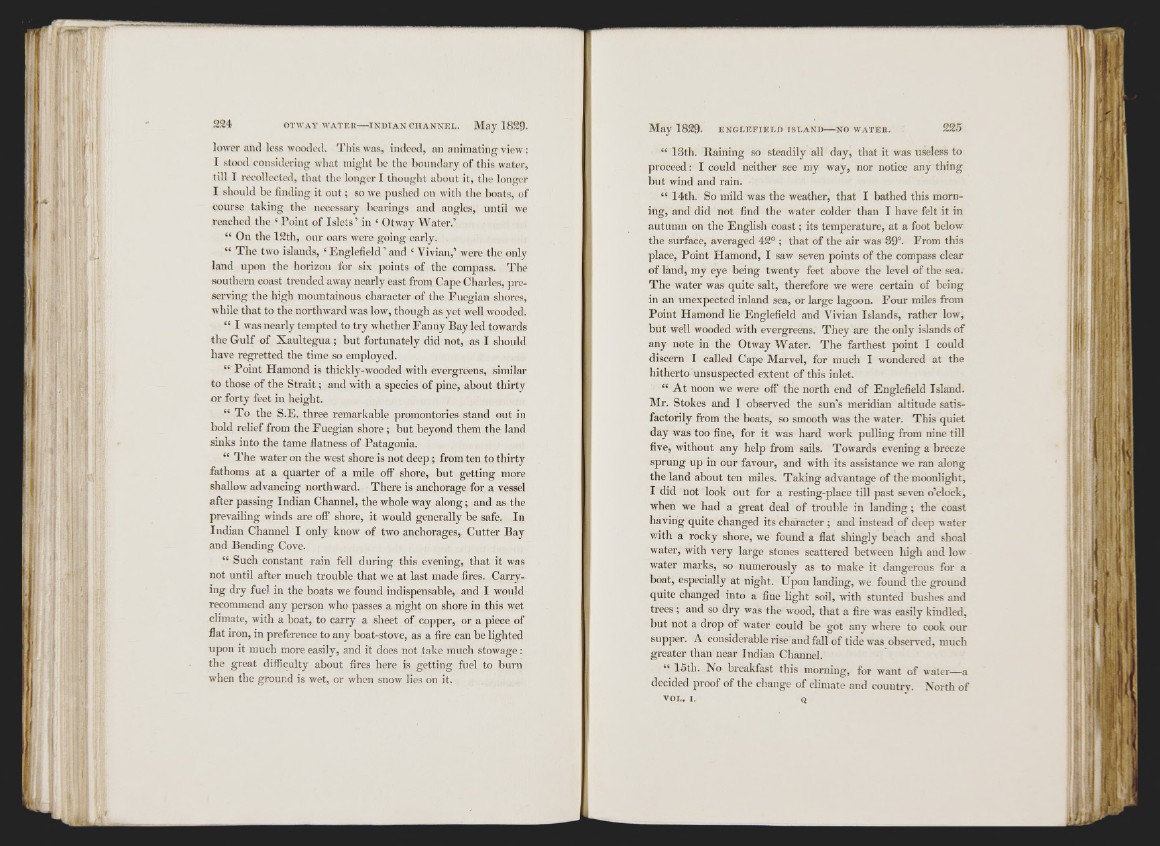
|U
lower ami less wooded. Tliis was, indeed, an animating view :
I .stixxl considering what might he tlie boundary of tliis watei',
till I recollected, tliat the longer I thought about it, the longer
I should be iinding it out; so we piislied on with llie boats, of
course taking tlie necessary bearings and angles, until we
reached the ‘ Point of Islets’ in ‘ Otway Water.’
“ On the I2th, our oars were going early.
“ The two islands, ‘ Englefield ’ and ‘ Vivian,’ were the only
land upon the horizon for six points of the compass. The
southern coast trended away nearly east from Cape Charles, preserving
the high mountainous character of the Fuegian shores,
while that to the northward was low, though as yet well wooded.
“ I was nearly tempted to try whether Fanny Bay led towards
the Gulf of Xaultegua; but fortunately did not, as I should
have regretted the time so employed.
“ Point Hamond is thickly-wooded with evergreens, similar
to those of the Strait; and with a species of pine, about thirty
or forty feet in height.
“ To the S.E. three remarkable promontories stand out in
bold relief from the Fuegian shore ; but beyond them the land
sinks into the tame flatness of Pataeonia.
“ The water on the west shore is not deep; from ten to thirty
fathoms at a quarter of a mile off shore, but getting more
shallow advancing northward. There is anchorage for a vessel
after passing Indian Channel, the whole way along; and as the
prevailing winds are off shore, it would generally be safe. In
Indian Channel I only know of two anchorages. Cutter Bay
and Bending Cove.
“ Such constant rain fell during this evening, that it was
not until after much trouble that we at last made fires. Carrying
dry fuel in the boats we found indispensable, and I would
recommend any person who passes a night on shore in this wet
climate, with a boat, to carry a sheet of copper, or a piece of
flat iron, in preference to any boat-stove, as a fire can be lighted
upon it much more easily, and it does not take much stowage:
the great difficulty about fires here is getting fuel to burn
when the ground is wet, or when snow lies on it.
“ IStli. Raining so steadily all day, that it was useless to
proceed: I could neither see my way, nor notice any thing
but wind and rain.
“ 14th. So mild was the weather, that I bathed this morning,
and did not find the water colder than I have felt it in
autumn on the English coast; its temperature, at a foot below
the surface, averaged 42° ; that of the air was 39°. From this
place, Point Hamond, I saw seven points of the compass clear
of land, my eye being twenty feet above the level of the sea.
The water was quite salt, therefore we were certain of being
in an unexpected inland sea, or large lagoon. Four miles from
Point Hamond lie Englefield and Vivian Islands, rather low,
but well wooded with evergreens. They are the only islands of
any note in the Otway Water. The farthest point I could
discern I called Cape Marvel, for much I wondered at the
hitherto unsuspected extent of this inlet.
“ At noon we were off the north end of Englefield Island.
Mr. Stokes and I observed the sun’s meridian altitude satisfactorily
from the boats, so smooth was the water. This quiet
day was too fine, for it was hard work pulling from nine till
five, without any help from sails. Towards evening a breeze
sprung up in our favour, and with its assistance we ran along
the land about ten miles. Taking advantage of the moonlight,
I did not look out for a resting-place till past seven o’clock,
when we had a great deal of trouble in landing; the coast
having quite changed its character ; and instead of deep water
with a rocky shore, we found a flat shingly beach and shoal
water, with very large stones scattered between high and low
water marks, so numerously as to make it dangerous for a
boat, especially at night. Upon landing, we found the ground
quite changed into a fine light soil, with stunted bushes and
trees; and so dry was the wood, that a fire was easily kindled,
but not a drop of water could be got anj’ where to cook our
supper. A considerable rise and fall of tide was observed, much
greater than near Indian Channel.
“ 15th. No breakfast this morning, for want of water—a
decided proof of tlie change of climate and country. North of
VOL. I. Q
.ii: r